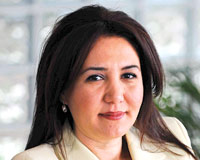
Ferhan Alesi. An intercultural communication consultant who has spent the last 17 years living and working in 10 different countries. Fluent in 5 languages, Alesi gathers her personal and professional experience on multiple cultures as an intercultural communication consultant. I had a nice talk with her on intercultural communication which remains mostly unknown in Turkey yet its importance is growing day by day as a result of globalization.
– Hi Ms. Alesi, what is ‘intercultural communication consultancy?’ Could you briefly define it for us?
Intercultural communication consultancy could be defined as building bridges between cultures. Every culture and every person from a culture carries traits and values unique to that specific culture. These values impact our lives and behaviors in many ways. The decisions we make, conversations we have with others and reactions to problems are all engrained in our culture. The right and the wrong, the beautiful and the ugly are all determined within our cultural perspective. What I do as an intercultural communication consultant is to tell expatriates about the new cultural values, the right and the wrong, so that they could be more successful in their new environment.
– Why is intercultural communication important?
Intercultural communication is very important because the world is getting smaller and smaller. People, who didn’t have the slightest idea about each other’s country, now have to work together and communicate effectively. One must not forget that people are always scared of the unknown. We see the same phenomenon here. Misunderstandings due to cultural differences and unintentional mistakes with cultural origin result in difficulties in working together. That’s the main reason why people should be aware of other cultures.
– Can you share a personal anecdote on the impact of intercultural communication?
Of course with pleasure. The story I’ll be telling you was a case of embarrassment for me years ago. As a young manager I was asked to prepare a presentation for a group of Japanese businessmen. I have to emphasize this: I was a Turkish girl in late 20s. I started to present the presentation I prepared to a group of 6 Japanese professionals all men. Yes I was definitely nervous but I think the problem was that I was completely different that the conventional Japanese way. I was using my body language more often – something Japanese are not used to. I was forcing myself to speak clearly and slowly unlike the way I normally speak. After a few minutes I noticed a few people closed their eyes, they were falling asleep watching my presentation! Oh God my presentation was so bad and so boring that all these men fell asleep! I panicked! These were very difficult moments for me…Think of it this way I was presenting in such a boring manner that these men are sleeping on me! This wasn’t a situation I could think otherwise as a Turk. Years later I found out that this was a Japanese way of listening in full concentration. The Japanese close their eyes in order to focus on the talk. Who would have guessed it!
– What would a person gain or lose by being successful and unsuccessful in intercultural communication?
The things that you would gain and lose are countless. Obvious gains could include communicating better thus being more successful in the job, gaining respect and admiration of the people you work with, and as a result of building stronger relations with subordinates becoming a better boss. The things you would lose are thought provoking: your co-workers could see you as disrespectful or inconsiderate. Therefore, they’re not respected or liked, nobody wants to work with you.
– What type of training does one need to complete in order to become an intercultural consultant? How did you start the profession?
I feel extremely lucky because I have both training and experience. I studied intercultural communication in the United States plus lived and worked in 10 different countries for 17 years. When I was going to school in the States and later working, I was different from my colleagues because of my multicultural background and personal experiences.
I decided to pursue a career in intercultural communication upon an American colleague’s encouragement. I met him at an international congress. While we were having a nice chat on our backgrounds, he suggested that I would be an excellent interculturalist having my experience and knowledge. Coming from an experienced professional who has dedicated years and years on cultural matters I took his words very seriously. I went to college to study intercultural communication and combined my previous cultural experience with a specific education. I am a perfect match for my profession. I love my job and people around me definitely notice it.
– What kind of background should an intercultural communication consultant have? What are the must-have qualities of a consultant?
This is a very important question, thanks for asking.
The other day I attended a meeting and met a young woman who just started her career in intercultural communication. During the meeting, she said that she knows intercultural communication very well because she lived in Germany as an expat wife. I wanted so much to tell her that one year experience as an expat wife does NOT make her an intercultural communication expert. She has so much to learn about culture let alone teaching others… The worst part is that she is not even aware of it….
You need to have a solid international background in order to merit ‘intercultural communication consultant’ title. Living in a foreign country for one year would not make anyone an expert. You need to live and work in 3 or 4 different countries for at least 2 or 3 years each. Cultural exposure is a must for this profession. Intercultural communication cannot solely be learned by reading books. The important thing is to integrate personal experiences and practical knowledge with theory and be able to guide expat professionals on how to act in the new culture.
The consultant should not only know the new culture but should also be knowledgeable in his own culture. It wouldn’t be enough to know Istanbul but Anatolia at large. People who only know a small part of their country should not consider becoming a consultant.
In addition, an intercultural communication consultant should know very well his own history and politics. You should be able to answer all kinds of question in an informative manner and prove that you can very well represent both cultures. I personally continue to attend seminars in political science and history and try to keep my knowledge fresh. In terms of personality traits, I believe that a consultant should be tolerant, open minded and excellent in communication skills.
– Is intercultural communication a familiar subject in Turkey?
Unfortunately no. Intercultural communication is mostly unknown . Very few people realise its importance in Turkey. I have been working in Turkey for the last 10 years to raise awareness on the subject. The first few years were very demanding. I fortunately gained a certain client portfolio today. Some of the international firms request my services as they’re aware of its importance. On top of this, I continue my efforts on gaining new clients by actively reaching out for HR managers and explaining the importance of intercultural communication. When I was living abroad, I used to spend less time and effort. You don’t feel like you need to explain yourself in Europe and the US as most people are aware of what intercultural communication is about.
– What do you teach in your intercultural communication trainings?
Trainings vary depending on professionals, companies and their unique needs. None of my trainings are the same, they are all professional and company specific. I design each and every training based on the professional’s profile, character, background and culture. The only common area of the trainings are the information about transition, culture shock, cultural values, traditions and rituals, religion and language. I also include business etiquette for businessmen.
– What are the attendees’ profiles? What do they aim by attending the training?
I worked with a lot of different profiles. People from 45 different cultures have attended my trainings. Most of them were high level managers, some expat wifes and children joined the program, some others were mid level managers and non-managerial professionals. While profiles could differ, the aim remains the same… They want to learn about the new culture, prevent wrong behavior, manage their personal and professional lives better by knowing more and ultimately succeeding more.
– What are the challenges you face while you talk about your services to potential clients?
That’s an excellent question. Unfortunately a very difficult one! When I first meet a person, I can usually imagine in a few minutes time the types of problems and difficulties the person could have to deal with. Of course it would not be appropriate to tell these people to attend my trainings. In these cases, I usually talk about my services and trainings and highlight the parts that would mostly interest them. Professionals who are at a certain level in their career have difficulties admitting they might need help adjusting to a new culture. Instead they usually prefer to depend on their own life and professional experience. For example, lately I met a newly appointed Italian CEO at a reception in Istanbul. At the event, I got the opportunity to meet him and had a brief talk about his 4 month experience in Turkey. In return, I told him about my business. In the end of our conversation, he smiled at me and told me that he had many friends and most probably he would not need my services. However, even our brief talk was enough for me to spot some misleading cultural signals.
By coincidence a week earlier I sat next to an employee from the same company. He told me that due to the wrong decisions he made the Italian CEO got a lot of bad reactions and reappointed to another post. In the end, the most important and appropriate thing is to accept that the new culture is a new world and a new game plan will prevail.
 Turkish Labor Law
Turkish Labor Law



